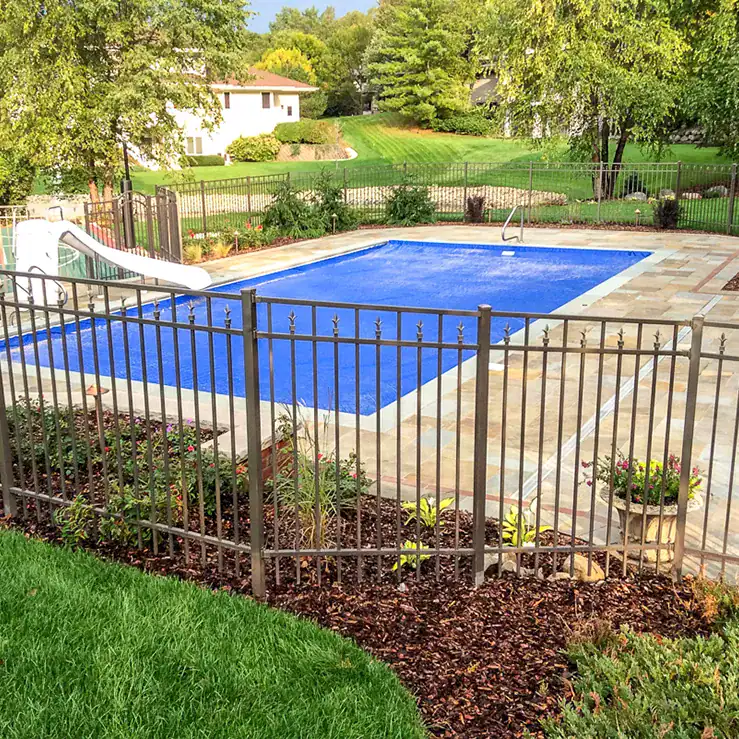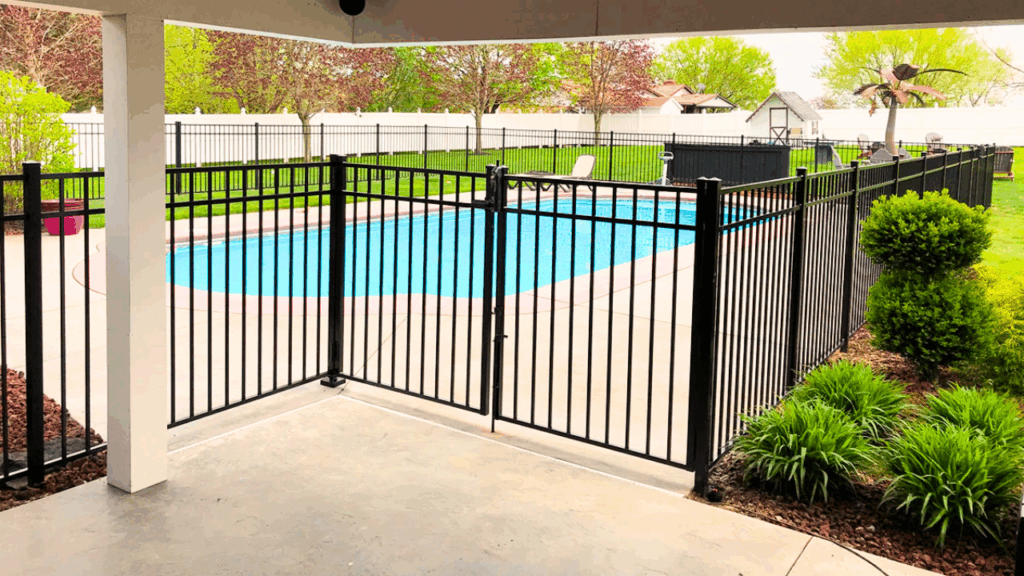Dreaming of a backyard oasis in Georgia but feeling overwhelmed by the permit process? Navigating the maze of Georgia pool permit requirements doesn’t have to derail your swimming pool plans.
Understanding these regulations and application processes before breaking ground can save you thousands in potential fines and prevent the emotional/financial heartbreak of having to remove an improperly permitted pool. Let’s dive into exactly what you need to know to make your pool installation smooth and compliant.
Contents
Overview of Georgia Pool Regulations
In Georgia, all residential swimming pools require a permit before construction can begin. The state follows the International Swimming Pool and Spa Code (ISPSC), which establishes minimum safety standards for pools. Local building departments enforce these regulations, with Georgia pool permit requirements varying slightly from county to county.
Private residential pools face different requirements than public pools. While public pools need annual operational permits, residential pools typically only require a one-time building permit.
Most Georgia counties require permits for any pool deeper than 24 inches, including both in-ground and above-ground installations. Building without proper permits can result in fines or complications when selling your home.
Private Swimming Pool Safety Requirements for State of Georgia
- In Georgia, private pool owners are required to create a gate/fence barrier around their pools to ensure the safety of children and invitees.
- Pool fences in Georgia must be a minimum of 4 feet in height, and if the pool is not taller than that minimum, a gate latch must be installed within 6 inches from the top of the fence.
- Georgia safety standards require that pool gates be self-closing and latching, with latches installed no lower than 4 feet above ground.

Key Steps to Secure a Permit
1. Contact Local Officials
Your first step should be contacting your local building department or permit office. Each county has specific pool permit requirements and processes in the state of Georgia.
We’ve gathered a few counties pool permit web pages for you to access. If you live in any of these counties, simply click over to their website to learn more about what your pool permit process will entail.
- Fayette County, GA – Pool Permit Overview
- Peach Tree City, GA – Pool Permit Applications
- Gwinett County, GA – Residential Pool Building Requirements
- Sandy Springs, GA – Pool Permit FAQs and Required Documents
- Brookhaven, GA – Pools and Spas Project Portal
- Newton County, GA – Application Package for Pool Permit
- Milton, GA – Pool Permit Process Overview
- Augusta, GA – Residential Swimming Pool Codes and Documents
- Cherokee County, GA – Pool Permit Application with details on Inspections
- Cobb County / City of Mableton, GA – Pool and Spa Permits, Inspections, and Forms
- Greene County, GA – Pool Permit Requirements
- Banks County, GA – Swimming Pool Permit Application
- Atlanta, GA – Swimming Pool Online Application
- Fulton County, GA – Pool Regulations and Permit Information
- DeKalb County, GA – Pool Permitting Services
- Fulton County, GA – Pool Permit Preparedness Packet
- Jasper County, GA – Swimming Pool Permit
- Forsyth County, GA – Residential Pool Permit Information
- Morgan County, GA – Pool Building Permits
- Dallas, GA – Swimming Pool Permit Application
- Jackson County, GA – Residential Building Permit Information
- City of Monroe, GA – Pool Permit Applications
- Paulding County, GA – Pool Permit Questions, Answered
- Carroll County, GA – Pool Permit Package
- Meriweather County, GA – Pool Permit Building Guide
- Bryan County, GA – Pool Permit Codes
- City of Grovetown, GA – Pool Permit Requirements
- Madison, GA – Residential Building Permit Information
- Oconee County, GA – Swimming Pool Permit Application
- Lawrenceville, GA – Residential Pool Building Permit Information
- Troup County, GA – Pool Permits and Inspections Information
- Dawson County, GA – Swimming Pool Permit Information
- Liberty County, GA – Pool Permit Packet
- City of Suwanne, GA – Residential Pool Permit Online Portal
- Town of Braselton, GA – Swimming Pool Permit Application
- City of Rome, GA and Floyd County, GA – Pool and Fence Application
- Savannah, GA – Residential Pool Permitting Services
Generally speaking, we recommend asking about zoning restrictions, setbacks from property lines, and any special considerations for your neighborhood. Most, if not all, counties offer online resources outlining their specific requirements. Some specific things you’ll want to take note of for your pool permit are:
- Septic systems: Special considerations may apply if your property uses a septic system
- Flood zones: Additional requirements exist for properties in designated flood areas
- HOA restrictions: Check if your neighborhood has additional rules beyond county codes
2. Gather Documents and Site Plans
Prepare a detailed site plan showing your property boundaries, the proposed pool location, and distances to property lines. Most counties require plans that include pool dimensions, depth, and equipment locations.
Your site plan must also show fencing or barrier details that comply with Georgia’s pool safety requirements. Include specifications for materials, height, and gate mechanisms.
3. Submit the Application
Complete the permit application forms provided by your local building department. Fees vary depending on your location and pool size.
Some counties allow online submissions, while others require in-person filing. Expect a review period for most residential pool permits.
4. Schedule Preliminary Inspections
Once your application is submitted, you’ll need to schedule an initial site inspection. This usually happens before any excavation begins.
Have your site plan and permit documents ready for the inspector. They may check for potential issues like utility lines or drainage concerns.
5. Finalize Permits and Begin Construction
After receiving approval, you’ll get your official permit to display at the construction site. Keep all documentation accessible throughout the building process.
With permit in hand, you can begin excavation and construction according to your approved plans. Any significant changes to the design will require additional approval.
Safety and Barrier Requirements
Georgia pool permit requirements include strict safety standards for barriers. All residential pools must have a barrier at least 48 inches high surrounding the entire pool area.
Barriers must be designed to prevent children from climbing over, under, or through them. Gates must be self-closing and self-latching, with latches placed at least 54 inches above the ground.
Some jurisdictions allow the house to serve as part of the barrier if doors leading to the pool have alarms or self-closing mechanisms. Pool covers alone are not typically considered adequate barriers under Georgia code.
- Barrier height: Minimum 48 inches from ground level
- Gate requirements: Self-closing, self-latching, opening away from pool
- Latch placement: At least 54 inches from the ground
- House as barrier: Requires door alarms or self-closing mechanisms

Inspection Milestones
Most Georgia counties require multiple inspections throughout the pool installation process. Scheduling these promptly helps avoid construction delays.
- Pre-construction inspection: Verifies property lines and site preparation before excavation begins.
- Structural inspection: Checks the pool shell, reinforcement, and plumbing before concrete is poured.
- Electrical inspection: Ensures all wiring meets safety codes to prevent electrical hazards.
- Final inspection: Confirms the completed pool meets all georgia pool permit requirements, including proper barriers and safety equipment.
Having your contractor present during inspections can help address any technical questions that arise.
Avoiding Common Pitfalls
Many homeowners face unexpected costs when they discover their property needs additional work to meet code requirements. Common issues include inadequate electrical service or non-compliant existing fences.
Check with your Homeowners Association before applying for permits. Ignoring HOA approval can lead to disputes even if you have county permits.
Utility line conflicts can cause major headaches and expenses. Always call 811 to have underground utilities marked before planning your pool location. To learn more about Georgia’s 811 Utilities Protection Center, visit their website.
Moving Forward With Confidence
Following Georgia’s pool permit requirements might seem daunting, but the process protects your investment and ensures your new pool is safe. Taking time to understand local regulations prevents costly mistakes and delays.
At Pool Brokers USA, we understand the permit process can be overwhelming for first-time pool owners. While we don’t handle permitting directly, we provide detailed specifications that make it easier for you to coordinate with local officials and contractors.
Our team can help you select the perfect fiberglass pool model that meets both your lifestyle needs and local code requirements. Request a Quote today to get started on your backyard transformation.

